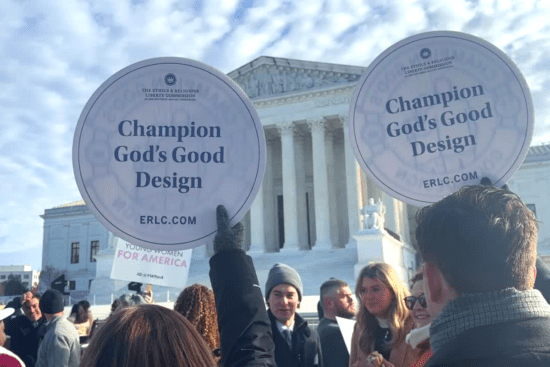The First Amendment is a fundamental protection granted in the U.S. Constitution. It secures the right to the free exercise of religion, and “it protects the freedom of speech, freedom of the press, the freedom of assembly, and the right to petition the government for a redress of grievances.”
In a recent court case called Faith Bible Chapel v. Tucker, the First Amendment is being challenged yet again.
Faith Bible Chapel is a case involving a private Christian school in Arvada, Colorado, and Gregory Tucker, its former employee. Its implications are significant:
- a favorable ruling could bring needed clarity to the “ministerial exception,”
- and an unfavorable ruling could lead to religious coercion and government intrusion into religious institutions, among other negative consequences.
This is a case to which Christians in America should pay close attention.
Why is it important?
- First Amendment: At its core, Faith Bible Chapel is a case concerning the First Amendment—which ensures the free and unimpeded exercise of religion for all American citizens. Pertaining to this case, as argued in an amicus brief submitted by the ERLC and other religious organizations, “the First Amendment protects the right of religious groups to choose, without governmental interference, who will teach their faith.”
- Ministerial exception: Additionally, one of the more consequential aspects of this case is its conflict with the ministerial exception and the effect an unfavorable ruling would have on religious institutions like Faith Christian Academy.
What is this case about?
Faith Christian Academy is a private Christian school in Colorado, and a ministry of Faith Bible Chapel. In June 2019, Tucker, who was employed by the school for 14 years, filed a federal lawsuit against Faith Bible Chapel, alleging that “the school violated his civil rights” by firing him “unjustly.”
The controversy began in 2018 when Tucker, then the chaplain and Bible teacher, “led a chapel service on race that became too political and handled an ensuing conflict in a way that contributed to division in the school and undermined the trust that school leadership and parents had in him.” The conflict resulted in Tucker’s departure.
Faith Christian Academy reported that Tucker left voluntarily, and he claimed that he was fired by the school. Tucker believed his civil rights were violated, so he filed suit against the school. Faith Christian Academy is responding to the lawsuit by defending its “right to freely choose its religious leaders without government interference.”
On behalf of Faith Bible Chapel, Becket asked the U.S. Supreme Court to review the case on Feb. 3, 2023. We are still awaiting a decision from the court as to whether they will hear this case in the upcoming term.
How is the ERLC involved?
The Ethics & Religious Liberty Commission joined other religious organizations in submitting an amicus brief in support of the appeal.
We believe, as the brief states, that the “Court should grant the petition for a writ of certiorari and reverse the decision” of the 10th Circuit court. The free exercise of religion is a fundamental right of the American people, outlined in the First Amendment, and should in no way be infringed upon by the government, nor should the related ministerial exception.
The ERLC will continue to uphold and advocate for the Baptist conviction that “[t]he state owes to every church protection and full freedom in the pursuit of its spiritual ends . . . has no right to impose penalties for religious opinions of any kind,” and that religious groups have “the right to form and propagate opinions in the sphere of religion without interference by the civil power.”
As we wait, we pray that justice would prevail in this case for the sake of Faith Christian Academy, the First Amendment, and the future of religious liberty for all in this country.
How was the case originally decided?
- In response to the initial suit, Faith Christian Academy filed a motion for summary judgment based on the ministerial exception, a legal doctrine that “allows religious organizations to make employment decisions for ministers without government interference.” That motion was rejected, and the case was allowed to proceed.
- The school appealed in June 2022, but the U.S. Court of Appeals for the 10th Circuit ruled 2-1 “that it lacked the power to consider the appeal and allow[ed] [Mr. Tucker] to continue with his case in the trial court.”
- The school then petitioned the 10th Circuit to rehear the case, but their petition was denied in November 2022.
- In early February 2023, the school filed a petition with the Supreme Court asking it to review the case.
What is the ministerial exception?
The ministerial exception: A “principle [that] says a ministry’s employees who teach religion, such as rabbis, imams, pastors, and principals or teachers at religious schools, can’t sue their ministry over their job.”
In Faith Bible Chapel, that’s precisely what happened, and, shockingly, the 10th Circuit court “concluded . . . that the ministerial exception offers no protection from the litigation process.”
Beyond the core question of the ministerial exception’s protections, this case also centers around how far into litigation a plaintiff may get when suing a church or religious organization that would be protected by the ministerial exception. In ERLC’s amicus brief, we argued that the decision of the 10th Circuit “poses grave risks to religious communities in this country, most of which are small and ill-equipped to withstand expensive and intrusive employment litigation.”
The ministerial exception is a threshold question that prevents the case from going forward. The brief points to the ways in which the litigation process, including discovery, is burdensome to churches and religious schools and itself creates an avenue for impermissible church-state entanglement.










